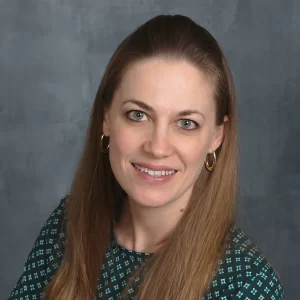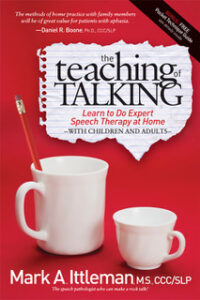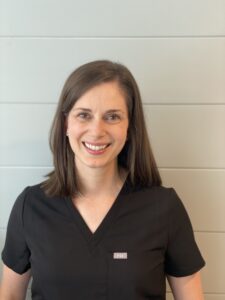Speech therapists do more than just talk
In the hospital, speech will be one of the first therapists you’ll meet – they do swallow tests to assess your ability to eat and drink as stroke can affect the mouth and throat muscles or be weakened from breathing tubes.
Speech therapists treat a number of stroke deficits like apraxia (difficulty with mouth posture forming words), aphasia (difficulty with understanding language, producing language or both), dysphagia (difficulty with swallowing) and ataxia (lack of muscle coordination).
They help survivors with reading and reasoning skills. They also teach cognitive behavioral training for patients confused about appropriate behavior, social interaction, conversational skills and answering questions like, “Does it snow in winter?”
Building a relationship with your speech therapist is very important as knowing how you think, gesture and relate to the world will help them teach and coach you. It’s ok to switch if you feel a particular therapist isn’t understanding you or your progress is stalling. A professional therapist will not make your decision personal and support what you need.
The fine print: We treat our listings seriously because nothing is more important to us than safe and successful stroke recovery. While we review the information provided by business owners and practitioners to verify the appearance of responsible, ethical treatment, keeping the stroke survivor’s best interests in mind, we have no ability to enforce business practices, set guidelines or practice standards and cannot guarantee the quality or outcome of their services. Please research your potential provider thoroughly before proceeding with hiring them.
We also reserve the right to refuse listing to any business or practitioner that does not appear to meet a minimum threshold of standard care. Example, providers falsely promising they can reverse brain damage, practicing in a field without proper training or predatory , controversial treatment plans that do nothing more than drain a survivor’s wallet.
The fine print: We treat our listings seriously because nothing is more important to us than safe and successful stroke recovery. While we review the information provided by business owners and practitioners to verify the appearance of responsible, ethical treatment, keeping the stroke survivor’s best interests in mind, we have no ability to enforce business practices, set guidelines or practice standards and cannot guarantee the quality or outcome of their services. Please research your potential provider thoroughly before proceeding with hiring them.
We also reserve the right to refuse listing to any business or practitioner that does not appear to meet a minimum threshold of standard care. Example, providers falsely promising they can reverse brain damage, practicing in a field without proper training or predatory , controversial treatment plans that do nothing more than drain a survivor’s wallet.

Integrative Recollective Aphasia Therapy
I am a Pennsylvania Speech Language Pathologist specializing in the area of Aphasia and Apraxia Treatment.
I have worked at the VA Pittsburgh Healthcare System, as a lead clinician in their unique intensive aphasia program, as well as a part time research assistant, working under some of the most well-known Aphasia research professionals and Aphasiologists in the field of speech pathology.
I have worked for a private practice, providing speech and language telepractice services to individuals with Aphasia and Apraxia.
I have observed far too often that individuals with Aphasia are told you have “plateaued” or you’ve made as much progress as you can make given the severity of your brain damage.
There is hope for ongoing progress and improved quality of life through motivation, hard work, and customized treatment plans.
Contact: Brooke Lang M.A, CCC-SLP
Telepractice Aphasiologist
Email: blang@iraphasiatherapy.com
Phone Number: 412-580-6338
Integrative Recollective Aphasia

Synaptic Therapy Services
Gretel Perez, M.S CCC-SLP, is a licensed and board-certified bilingual speech-language pathologist and owner of Synaptic Therapy Services, specializing in treating clients with neurological impairments affecting language, voice, cognition, and swallowing function. She has evaluated, diagnosed, and treated individuals with, aphasia, dysarthria, dysphagia, apraxia of speech (AOS), articulation/phonological disorders, pragmatic deficits, fluency disorders, and voice and velopharyngeal disorders.
She has a keen interest in treating adults who are experiencing cognitive-linguistic deficits after a stroke and brain injury.
Using a patient-centered approach and evidence-based practice, she strives to provide functional and meaningful improvements that impact an individual’s quality of life.
Contact: Gretel Perez-Ortiz, M.S CCC-SLP
Home Health Service in Miami and Telehealth
Email: neuroslpgretel@gmail.com
Phone Number: (305) 710-4400

iCommunicare
Abbe Simon, M.A., CCC-SLP, has been a speech language pathologist for 24 years. She has worked in a variety of settings including acute and rehabilitation hospitals, assisted living facilities, skilled nursing facilities, aphasia centers, and outpatient clinics, while seeing clients privately.
Throughout her career, she has remained passionate about working with adults with neurological language disorders resulting from stroke, Traumatic Brain Injury, brain tumors, degenerative disease, and/or age related memory decline.
Abbe specializes in evaluating and treating people who have aphasia. Her approach revolves around an individual’s goals to create functional, engaging, relevant, and purposeful outcomes that go beyond a treatment room. She provides therapy driven by evidenced-based practices while modifying programs to suit each individual client’s needs. Abbe prides herself on the relationships she builds with clients and their communication partners.
As a SLP, Abbe has seen first hand how care partners’ lives change when a loved one receives a sudden life changing diagnosis. Because this new role often impacts health and wellness, Abbe has created programs that coach care partners along their unexpected journey.
Contact Person: Abbe Simon M.A, CCC/SLP
Address: NC Triangle and Limited Telepractice
Email: abbesimon@icommunicarenc.com
Phone Number: 917-648-7558

The Teaching of Talking
Moshe Mark Ittleman, M.S., CCC/SLP has worked in some of the nation’s best rehabilitation hospitals and has lectured world wide to caregivers, therapists, and health care providers. He is dedicated to helping those with neurological difficulties learn to talk or talk again.
He also helps care partners and people with speaking difficulties through online speech therapy.
The speech therapy methods for apraxia or aphasia can be easily learned by the caregiver and individual with the speaking difficult whether adult or child.
We talk about the individual’s life, interests, family, occupation and passions. We simultaneously provide methods to improve speaking.
Speech therapy is fun since we talk about the personal interests of the individual.
We offer a free Get-Acquainted Visit.
Contact Person: Mark Ittleman M.S CCC/SLP
Address: Telepractice
Email: markittleman@teachingoftalking.com

Highlands Speech Therapy
Contact Person: Karen Malone
Address: Telehealth available for residents of Virginia
In-home visits available for individuals local to Abingdon, VA.
Email: karen@highlandsSLP.com
Phone Number: 276-230-0602

IRL Social Skills Coaching
Mara, Founder and Chief Clinical Officer at IRL Social Skills, is a Speech-Language Pathologist with first-hand experience in stroke navigation, specializing in aphasia, apraxia and caregiver training, specifically with younger stroke survivors.
Well-versed in the interactive process with employers to get accommodations for return to work, and creating a team approach among friends and professionals of the survivor and care partners.
Neuroplasticity is the name of the game!
Contact Person: Mara McLoughlin, MS, CCC-SLP
Address: 10605 SE Bush Street, Portland OR
Email: mara@irlsocialskills.com
Phone Number: 971-373-4738